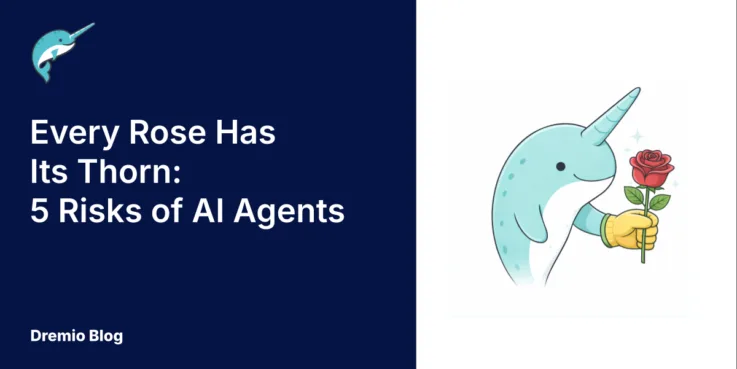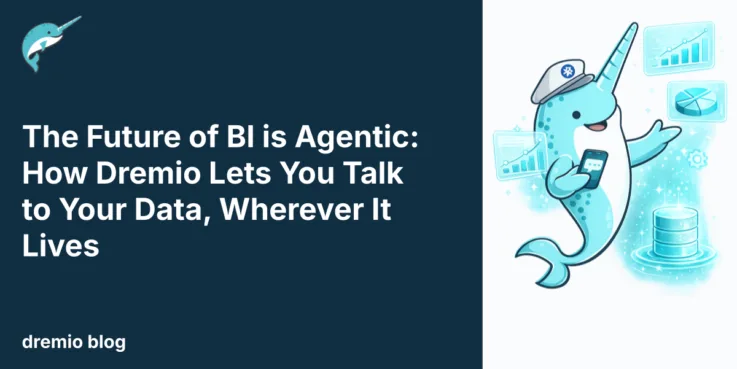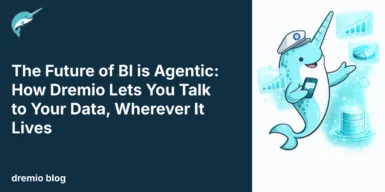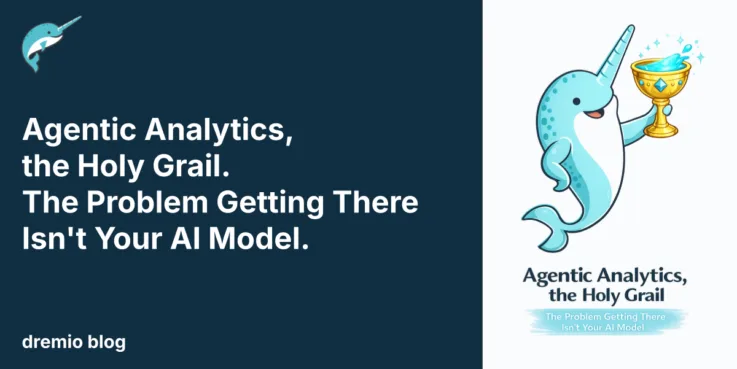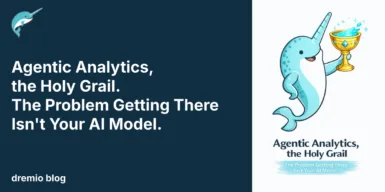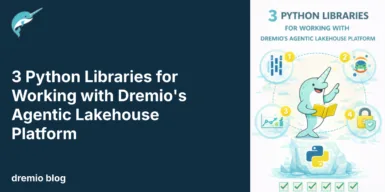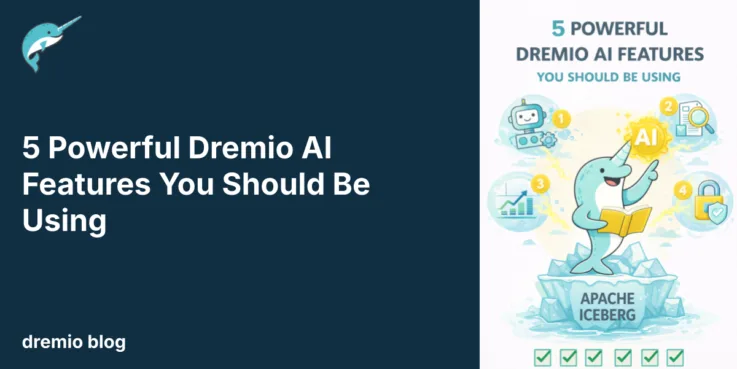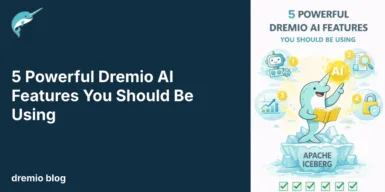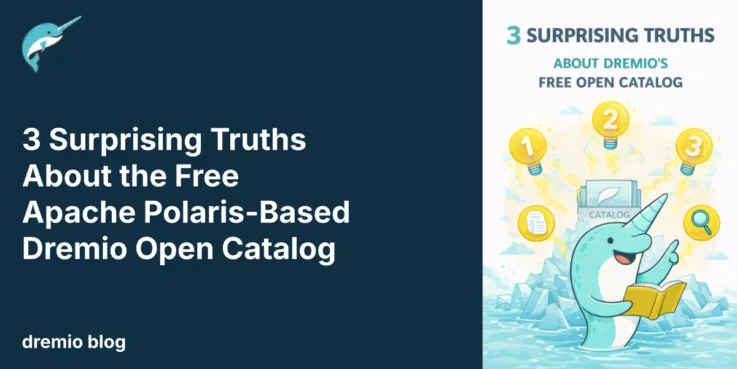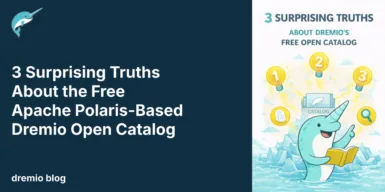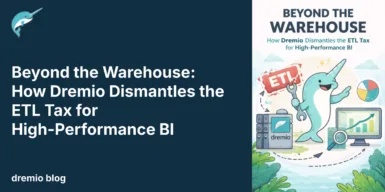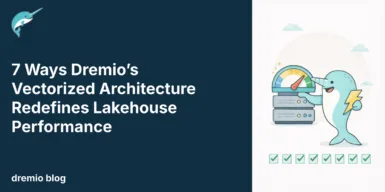Featured Articles
Popular Articles
-
 Product Insights from the Dremio Blog
Product Insights from the Dremio BlogFrom Raw Data to Risk Insights: A Hands-On Guide to the Agentic Lakehouse
-
 Product Insights from the Dremio Blog
Product Insights from the Dremio BlogThe End of Manual Rebalancing: How to Build an Agentic Lakehouse in 15 Minutes
-
 Product Insights from the Dremio Blog
Product Insights from the Dremio BlogThe Brain of the Agentic Lakehouse: Inside Dremio’s Open Catalog Architecture
-
 Product Insights from the Dremio Blog
Product Insights from the Dremio BlogGet a Supercharged Iceberg Catalog: Introducing Dremio and Apache Polaris
Browse All Blog Articles
-
 Product Insights from the Dremio Blog
Product Insights from the Dremio BlogFrom Raw Data to Risk Insights: A Hands-On Guide to the Agentic Lakehouse
The true power of Dremio’s AI Semantic Layer is that it provides the "grounding" context for AI agents. Because the catalog contains rich metadata and defined relationships, the AI agent doesn't just see columns; it understands business concepts. -
 Product Insights from the Dremio Blog
Product Insights from the Dremio BlogThe End of Manual Rebalancing: How to Build an Agentic Lakehouse in 15 Minutes
Data is no longer a static resource for human eyes; the Agentic Lakehouse is about building an ecosystem where AI can act on data as effectively as we do. -
 Product Insights from the Dremio Blog
Product Insights from the Dremio BlogThe Brain of the Agentic Lakehouse: Inside Dremio’s Open Catalog Architecture
The Dremio Open Catalog is the vital bridge between open-source flexibility and enterprise-grade AI readiness. By moving from a "static mirror" of Iceberg files to a semantic, agent-ready architecture, Dremio allows organizations to finally realize the promise of a self-managing data lakehouse. -
Product Insights from the Dremio Blog
Get a Supercharged Iceberg Catalog: Introducing Dremio and Apache Polaris
Dremio Catalog fundamentally changes the game for data lakehouse adoption. By providing a free, fully managed, and feature-rich service built on the open Apache Polaris project, Dremio removes the significant barriers to standing up a universal Iceberg catalog. -
Product Insights from the Dremio Blog
5 Ways Dremio Delivers an Apache Iceberg Lakehouse Without the Headaches
The true value of Dremio isn't just one feature, but its integrated, "all-in-one" platform. This approach contrasts sharply with the DIY method, which often results in a lakehouse that is perpetually a work-in-progress, stitched together with technical debt. -
Product Insights from the Dremio Blog
How Small Companies Can Build an AI-Powered Lakehouse from Day One
With a platform like the Dremio Agentic Lakehouse, you can leapfrog legacy architectures and move directly to a flexible, cost-effective, and AI-native data platform. -
Dremio Blog: Various Insights
Every Rose Has Its Thorn: 5 Risks of AI Agents
Agentic AI offers several compelling benefits that are transforming how we work and solve problems. The key difference from traditional AI is agency, the agent’s ability to plan, use tools, take actions in sequence, and work toward goals rather than just responding to individual prompts. There are many upsides to embracing AI agents in your […] -
Product Insights from the Dremio Blog
The Future of BI is Agentic: How Dremio Lets You Talk to Your Data, Wherever It Lives
Dremio's integrated platform transforms the agentic analytics challenge from a complex systems integration problem into a straightforward data conversation. By unifying federation, autonomous performance, a business-centric semantic layer, and conversational interfaces, Dremio eliminates the friction that has historically kept valuable insights locked away in data silos. -
Product Insights from the Dremio Blog
Agentic Analytics, the Holy Grail. The Problem Getting There Isn’t Your AI Model.
Success depends on three non-negotiable pillars: deep business context from a semantic layer, universal access through live data federation, and interactive speed delivered by autonomous performance features. -
Product Insights from the Dremio Blog
3 Python Libraries for Working with Dremio’s Agentic Lakehouse Platform
Dremio's power can be fully leveraged within the Python ecosystem thanks to these versatile community-driven libraries. -
Product Insights from the Dremio Blog
5 Powerful Dremio AI Features You Should Be Using
Dremio's approach reveals a clear vision for the future of the data stack: AI is not a bolt-on feature but a foundational capability woven throughout the entire data lakehouse platform. -
Product Insights from the Dremio Blog
3 Surprising Truths About the Free Apache Polaris-Based Dremio Open Catalog
Dremio’s Open Catalog delivers a free, interoperable, and flexible foundation for the modern data lakehouse. By embracing open standards and a "bring your own" philosophy for compute, storage, and AI, Dremio provides a platform that prioritizes user choice and cost control over vendor lock-in. This commitment to openness gives you the flexibility to select the best tools to achieve your data analytics goals. -
Product Insights from the Dremio Blog
5 Counter-Intuitive Dremio Performance Tips for Lightning-Fast Iceberg Queries
Achieving elite Dremio performance is a blend of smart architecture, understanding the platform's autonomous capabilities, and applying targeted, tool-assisted tuning. By moving beyond the basics, you can create a truly interactive experience for your data consumers. -
Product Insights from the Dremio Blog
Beyond the Warehouse: How Dremio Dismantles the ETL Tax for High-Performance BI
Dremio is the engine that finally transforms the lakehouse into a high-performance BI reality. By unifying namespaces, automating acceleration via Reflections, and utilizing the power of Apache Iceberg, it moves the organization away from the "data moving" era. -
Product Insights from the Dremio Blog
7 Ways Dremio’s Vectorized Architecture Redefines Lakehouse Performance
The Dremio performance story is a narrative of engineering excellence meeting operational simplicity. By combining the efficiency of Apache Arrow, the "magic" of Iceberg-backed Reflections, and the intelligence of an AI-driven optimizer, Dremio has built a system where performance is an automated byproduct of the architecture.
- 1
- 2
- 3
- …
- 36
- Next Page »










